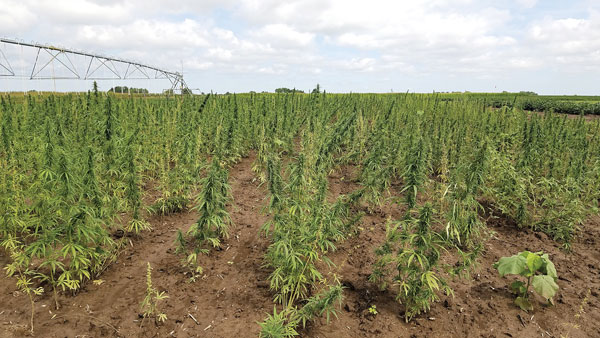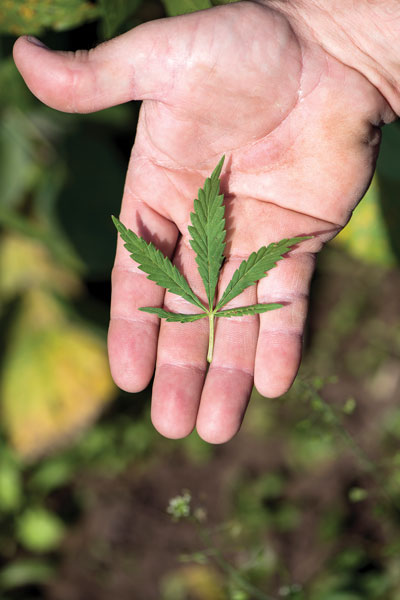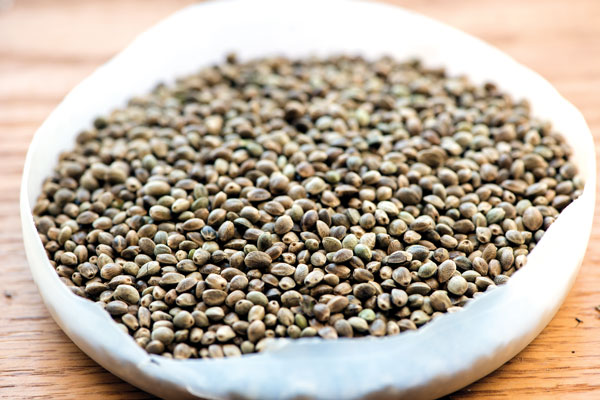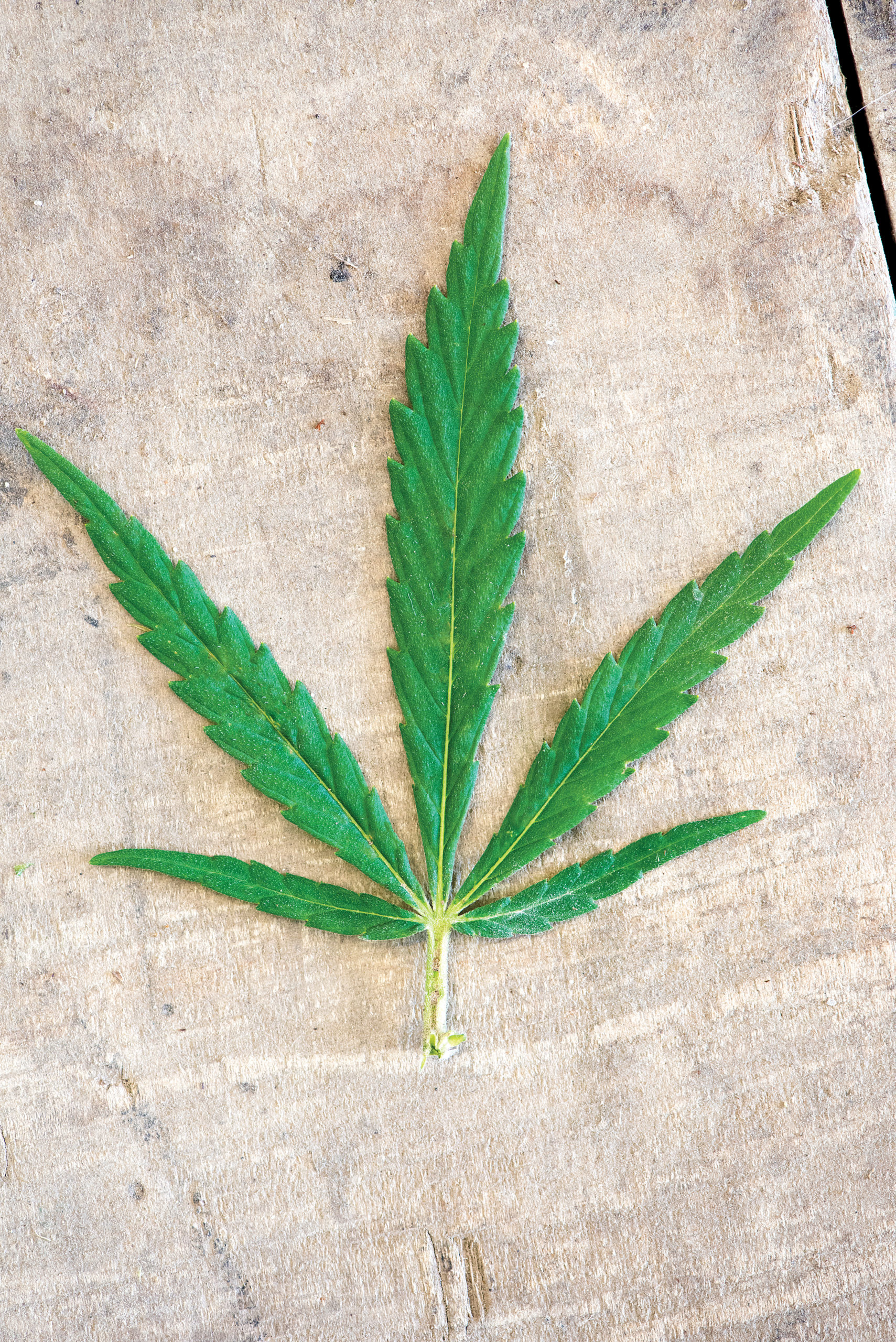
The Hemp Hype
October 5, 2019
Written By Jason Jenkins
As legal hemp production produces headlines, hurdles exist for Missouri growers
Kelly Nelson has grown his share of cash crops during 20 growing seasons at the University of Missouri’s Greenley Research Center just outside of Novelty, Mo. The research agronomist has raised everything in northeast Missouri from the traditional commodity crops of corn and soybeans to more specialized crops such as fescue grass seed, pennycress oilseed and even varieties of rice growing hundreds of miles north of where you’d expect to find them.
But in 2019, Nelson planted what just might be the most novel of the crops he’s planted at Novelty — industrial hemp. It certainly has garnered the most attention.
“The amount of interest we had in our hemp plot during our field day in August was tremendous,” Nelson says. “There were a lot of questions, folks trying to understand what opportunities there could be for a new crop. It’s exciting.”
Nelson is part of a team of MU researchers across the Show-Me State who got a jump on growing hemp this year to offer some agronomic answers to producers considering the crop in 2020. Hemp seed, donated by St. Louis-based Tiger Fiber, was planted at seven MU research farms, according to Tim Reinbott, assistant director of the MU Agricultural Experiment Station.
The research was made possible by the passage of Missouri Senate Bill 133 in late June, which repealed a pilot program authorized in 2018 and removed acreage restrictions on hemp production — putting state laws in line with federal requirements.
The 2018 Farm Bill, signed by President Donald Trump this past December, redefined hemp as an agricultural commodity, ending nearly a half-century of prohibition under the Controlled Substances Act of 1970. With this barrier removed, Missouri and other states are scrambling to establish a foothold in an infant industry where questions about the plant and its potential as a crop abound.
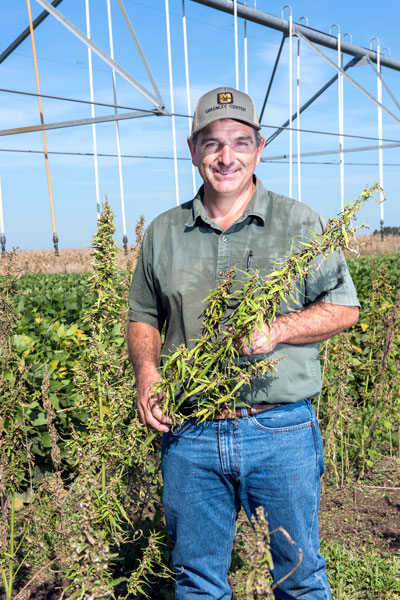 Kelly Nelson, research agronomist at the University of Missouri’s Greenley Research Center, grew industrial hemp this past summer to learn more about the crop, which is once again considered an agricultural commodity.
Kelly Nelson, research agronomist at the University of Missouri’s Greenley Research Center, grew industrial hemp this past summer to learn more about the crop, which is once again considered an agricultural commodity.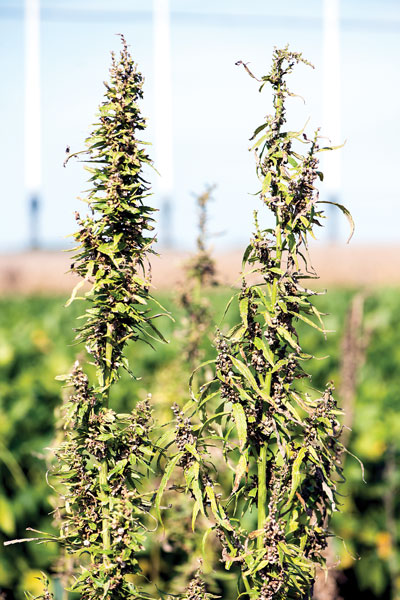 Harvesting hemp for both seed and fiber could offer farmers two potential crops in one plant.
Harvesting hemp for both seed and fiber could offer farmers two potential crops in one plant.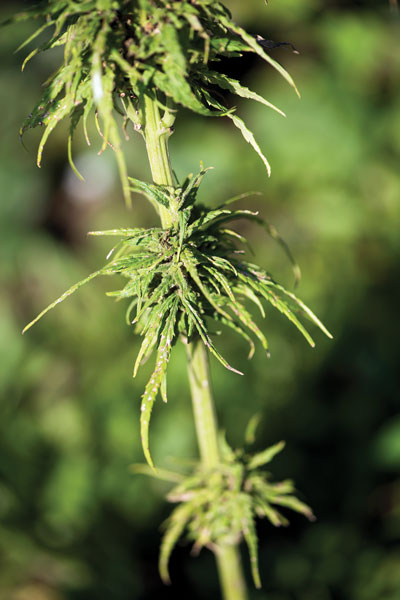 As with other crops, there are different varieties of hemp, and MU researchers found differences among them during field trials.
As with other crops, there are different varieties of hemp, and MU researchers found differences among them during field trials.
Hemp History
The story of hemp production in Missouri is almost as old as the state itself. According to the 1913 Yearbook of the U.S. Department of Agriculture, farmers planted their first hemp crops here in 1835. It was an era of sailing vessels, and hemp was the fiber of choice for sailcloth and rope.
Between 1840 and 1860, the hemp industry flourished in Kentucky, Illinois and Missouri due to strong demand by the U.S. Navy. The majority of Missouri’s hemp was produced in the central part of the state along the Missouri River.
In 1850, the Census of Agriculture reported that Missouri farmers had grown 16,028 tons of hemp — second only to Kentucky’s production of 17,787 tons. Hemp warehouses sprung up from Lexington and Glasgow to Arrow Rock and Rocheport. Rope-making became a thriving industry in these towns and others such as Miami.
Hemp would even play a pivotal role in one of Missouri’s most well-known Civil War battles, the First Battle of Lexington in September 1861. During the three-day siege, pro-Confederate Missouri State Guard soldiers, led by Maj. Gen. Sterling Price, worked to evict Union soldiers from this town in the heart of Missouri’s “Little Dixie” region.
With the federal soldiers well entrenched, the Missouri State Guard devised a plan. They soaked hemp bales in the nearby Missouri River overnight, rendering them impervious to rifle fire as well as fireproof against red-hot cannon balls. The “Battle of the Hemp Bales” ended in a Confederate victory, bolstering Southern sentiment in the area. Evidence of the battle remains today in Lexington, where a cannonball can be seen lodged in a column on the front of the Lafayette County Courthouse.
However, hemp’s heyday wouldn’t last much past the Civil War in Missouri. Processing the fiber was labor-intensive, making it less profitable than other sources such as cotton, jute and sisal. The advent of steam-powered ships also meant fewer sails, and steel wire reduced demand for hemp cordage.
Nationwide production continued to fall. Then, in 1937, Congress passed the Marijuana Tax Act, which all but eliminated the crop. While hemp for fiber would see a brief resurgence during World War II, after the war, synthetic fibers would signal a death knell to the hemp industry. The Controlled Substances Act in 1970 ensured that legal agricultural production ceased.
Cannabis Comeback
Despite the prohibition of domestic cultivation, demand for hemp-derived products and materials has never ceased. With roughly 50,000 known uses for the plant’s fiber, seeds and the compound CBD, hemp is used in everything from supplements and cosmetics to packaging, clothing and insulation. Companies have imported hemp from Canada, China and Europe. As societal views toward marijuana have softened in the United States in recent years, a door of opportunity has opened to again allow American farmers the opportunity to cash in on a hemp cash crop.
Among those farmers whose interest has been piqued by hemp is Neal Bredehoeft of Alma, Mo., who currently sits on the board of the Missouri Hemp Producers Association. Bredehoeft’s grandparents founded the family farm more than a century ago in Lafayette County — the same county where Civil War soldiers once rolled hemp bales to victory in Lexington.
“We’re a long way from planting any on our farm, but we’re typical farmers,” he says. “We’re looking for another crop that we can grow that may produce a profit and diversify our operation a little bit more.”
While Bredehoeft has seen his share of “alternative” crops come and go during his more than 40 years of full-time farming, he’s encouraged by the fact that hemp was once grown successfully in Missouri. He says the non-profit association, which partnered on the MU trial this year, is producer-focused and working to ensure farmers get the correct information.
“When you have a new industry like this, there’s always some folks who are not going to be on the up and up, so we’re trying to make sure that producers come first,” Bredehoeft says. “In reality, we don’t have an industry in Missouri yet, so how do we move everything — production and processing — forward together?”
Nelson and his fellow MU researchers are doing their part to provide information on the production. During their 2019 trials, they planted four hemp varieties at seven locations around the state. They planted into both conventionally tilled soil and no-till soil with two row spacings at a seeding rate of 40 pounds per acre.
“We planted the last week of June as soon as we got approval,” Nelson explains. “Even though the plots were planted later, some of our bigger plants were 5 feet tall or a little taller. Usually they’re in the 8-to-10-foot range.”
Nelson harvested his plot in late September, and while seed and fiber yield data is still being analyzed, he says that big differences were evident among hemp varieties.
“Variety selection is going to be critical, not only for the biomass but also the seed production,” he says. “We had two different row spacings, and I would say the narrow rows had at least 30 percent greater yield than my wide rows.
“One of the biggest challenges is going to be weed control, because there are no products currently labeled for hemp,” he adds. “But it’s a big crop that’s very competitive. If we can put down a pre-emergent and go with an early planting date with narrow row spacings, it’s got the potential to have a closed canopy and outcompete a lot of the weed species.”
Nelson adds that the timing of harvest also will be important, especially for growers seeking both a seed crop and a fiber crop.
“That first week of September, you could see some seeds were mature and harvestable, but the majority of the plant was not ready,” he says. “So, there’s probably a sweet spot when you harvest for seed and get that dual purpose. We have a lot of diversified crops, and each has its own unique personality. It brings an art into farming.”
Such agronomic guidance is what Bredehoeft and his fellow farmers are waiting for — along with a set of rules. In late October, USDA announced the establishment of the U.S. Domestic Hemp Production Program, which creates a regulatory framework for growing hemp nationwide. Under the program, USDA can approve hemp-production plans developed by states, including Missouri. Once a state’s plan is federally approved, growers are eligible for a number of agricultural programs, including crop insurance, farm loans and conservation programs.
The Missouri Department of Agriculture posted its own proposed plan and regulations for the Missouri Industrial Hemp Program in early October. The rules, which Missouri will submit to USDA, will amend existing regulations and transition the legal growth of industrial hemp in the state. A public comment period on the state rules runs from Nov. 1 to Dec. 1, 2019.
“In general, we want to make sure the regulations are not too burdensome so that producers who want to grow hemp can do so,” Bredehoeft says.
For more information on Missouri’s Industrial Hemp Program, visit www.agriculture.mo.gov/plants/industrial-hemp/ or call 573-522-0351. Learn more about hemp and the Farm Bill at www.farmers.gov/manage/hemp.



